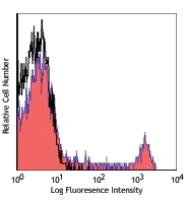-
Sign In
-

-
 Sony Biotechnology
Sony Biotechnology
-

-
 Sony Biotechnology
Sony Biotechnology
PerCP anti-human CD16
Antibodies Single
Sony
3G8
Flow Cytometry
Mouse IgG1, κ
Human
Human PMN cells
2110145
$158.00
Description
CD16 is known as low affinity IgG receptor III (FcγRIII). It is expressed as two distinct forms (CD16a and CD16b). CD16a (FcγRIIIA) is a 50-65 kD polypeptide-anchored transmembrane protein. It is expressed on the surface of NK cells, activated monocytes, macrophages, and placental trophoblasts in humans. CD16b (FcγRIIIB) is a 48 kD glycosylphosphatidylinositol (GPI)-anchored protein. Its extracellular domain is over 95% homologous to that of CD16a, and it is expressed specifically on neutrophils. CD16 binds aggregated IgG or IgG-antigen complex which functions in NK cell activation, phagocytosis, and antibody-dependent cell-mediated cytotoxicity (ADCC).
Formulation
Phosphate-buffered solution, pH 7.2, containing 0.09% sodium azide and 0.2% (w/v) BSA (origin USA).Recommended Usage
Each lot of this antibody is quality control tested by immunofluorescent staining with flow cytometric analysis. For flow cytometric staining, the suggested use of this reagent is 5 microL per million cells or 5 microL per 100 microL of whole blood. It is recommended that the reagent be titrated for optimal performance for each application.
* PerCP has a maximum absorption of 482 nm and a maximum emission of 675 nm.
References
1. Knapp W, et al. Eds. 1989. Leucocyte Typing IV. Oxford University Press. New York.
2. Schlossman S, et al. Eds. 1995. Leucocyte Typing V. Oxford University Press. New York.
3. Edberg J, et al. 1997. J. Immunol. 159:3849. (IP)
4. Hoshino S, et al. 1991. Blood 78:3232. (Stim)
5. Tamm A, et al. 1996. Immunol. 157:1576. (Block)
6. Da Silva DM, et al. 2001. Int. Immunol. 13:633. (IHC)
7. Holl V, et al. 2004. J. Immunol. 173:6274. (Block)
8. Hober D, et al. 2002. J. Gen. Virol. 83:2169. (Block)
9. Brainard DM, et al. 2009. J. Virol. 83:7305. PubMed
10. Smed-Sörensen A, et al. 2008. Blood 111:5037. (Block) PubMed
11. Timmerman KL, et al. 2008. J. Leukoc. Biol. 84:1271. (FC) PubMed
12. Yoshino N, et al. 2000. Exp. Anim. (Tokyo) 49:97. (FC)
13. Rout N, et al. 2010. PLoS One 5:e9787. (FC)
14. Kim WK, et al. 2006. Am. J. Pathol. 168:822. (FC)
15. Boltz A, et al. 2011. J. Biol Chem. 286:21896. PubMed
16. Wu Z, et al. 2013. J. Virol. 87:7717. PubMed


